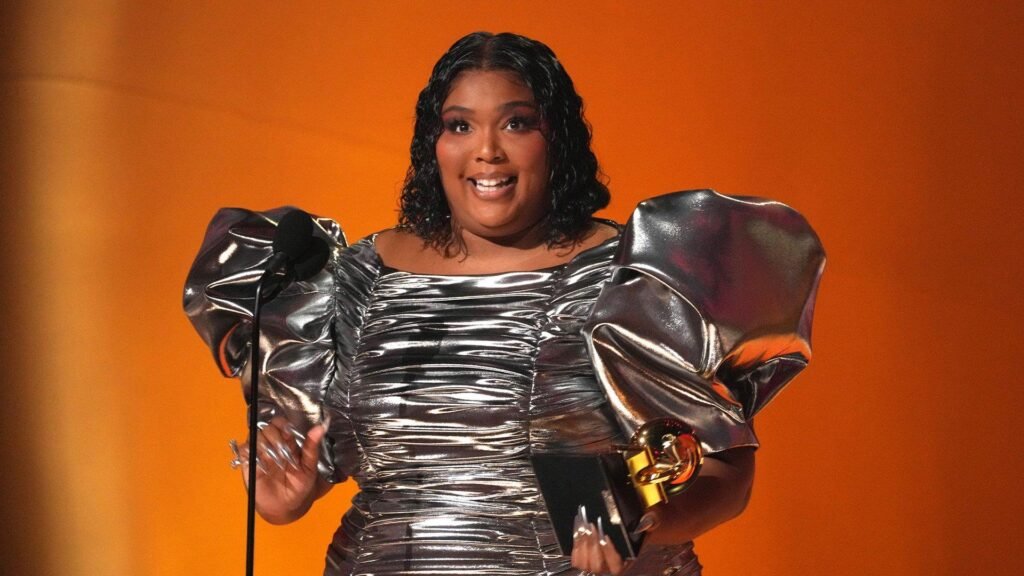Lizzo’s Early Life and Musical Beginnings
Melissa Viviane Jefferson, known worldwide as Lizzo, was born on April 27, 1988, in Detroit, Michigan. Raised in a family that cherished music, she grew up listening to gospel, soul, and hip-hop, which deeply influenced her artistic style. At the age of 10, Lizzo’s family moved to Houston, Texas, where she began playing the flute—a skill that would later become a signature part of her performances. Despite her early passion for music, Lizzo faced significant challenges, including bullying and financial struggles. Her father’s sudden death when she was 21 was a devastating blow, but she channeled her grief into music, using it as an outlet for her emotions and ambitions.
Lizzo The Grind Before the Glory
Lizzo’s rise to fame was anything but overnight. After dropping out of the University of Houston, she moved to Minneapolis, where she immersed herself in the city’s vibrant indie music scene. She joined several bands, including the electro-soul group Lizzo & the Larva Ink, and later the indie-pop duo Lizzo & the Larva Ink. During this time, she worked odd jobs to make ends meet, including stints as a bartender and a backup singer. Her relentless hustle paid off when she released her debut studio album, Lizzobangers, in 2013, which garnered critical acclaim but limited commercial success. It wasn’t until her 2016 album, Coconut Oil, that she began gaining mainstream attention, thanks to its empowering anthems like “Good as Hell.”

Breakthrough with “Truth Hurts” and Cultural Impact
Lizzo’s career skyrocketed in 2019 with the release of her third studio album, Cuz I Love You, and the viral success of “Truth Hurts.” Originally released in 2017, the song became a sleeper hit two years later, thanks in part to its popularity on TikTok and its inclusion in the Netflix film Someone Great. The track’s catchy refrain—”I just took a DNA test, turns out I’m 100% that bitch”—became a cultural phenomenon, cementing Lizzo’s status as a champion of self-confidence and body positivity. The song peaked at No. 1 on the Billboard Hot 100, making Lizzo the first solo female rapper to achieve this feat since 2017.
Championing Body Positivity and Mental Health
Beyond her music, Lizzo has become a global icon for body positivity and self-acceptance. She frequently uses her platform to challenge societal beauty standards, encouraging fans to love themselves unapologetically. In 2019, she launched the #BodyGoals campaign, showcasing diverse body types and promoting mental wellness. Lizzo has also been open about her own struggles with anxiety and depression, advocating for mental health awareness and the importance of therapy. Her authenticity resonates deeply with fans, many of whom credit her with helping them embrace their own imperfections.
Philanthropy and Activism
Lizzo’s influence extends beyond entertainment. She is a vocal advocate for social justice, particularly for the Black Lives Matter movement and LGBTQ+ rights. In 2020, she donated $500,000 to organizations supporting Black communities, including the Bail Project and the Marsha P. Johnson Institute. She also partnered with Amazon Music to create the “Black Business Forever” initiative, which provides grants to Black-owned businesses. Lizzo’s commitment to uplifting marginalized communities has earned her widespread admiration, proving that her impact goes far beyond the stage.
The Flute-Playing Superstar
One of Lizzo’s most distinctive traits is her mastery of the flute, which she affectionately named “Sasha Flute.” She often incorporates live flute solos into her performances, blending classical technique with modern hip-hop and pop. Her flute-playing skills even earned her an invitation to perform with the National Symphony Orchestra in 2019. This unique talent sets her apart in the music industry and showcases her versatility as an artist.

Lizzo Grammy Glory and Historic Achievements
Lizzo’s talent has been recognized with numerous accolades, including three Grammy Awards in 2020 for Best Urban Contemporary Album (Cuz I Love You), Best Pop Solo Performance (“Truth Hurts”), and Best Traditional R&B Performance (“Jerome”). She made history as the first Black woman to win the latter two categories in the same year. Her electrifying performances, such as her 2020 Grammy medley featuring a flute solo and a tribute to Kobe Bryant, have solidified her reputation as a must-see live act.
Controversies and Resilience
Despite her success, Lizzo has faced criticism, particularly from those who accuse her of promoting unhealthy lifestyles. She has repeatedly clapped back, emphasizing that health is not determined by size and that self-love is a radical act of defiance in a judgmental world. In 2022, she faced backlash from some fans after releasing “Grrrls,” a song accused of containing an ableist slur. Lizzo responded swiftly, re-recording the track with an updated lyric and apologizing for the oversight—a move that demonstrated her accountability and growth.
Lizzo Legacy: More Than Music
Lizzo’s influence transcends music. She has redefined what it means to be a superstar in the 21st century, using her voice to advocate for self-love, social justice, and mental health. From her humble beginnings in Houston to her status as a Grammy-winning icon, her journey is a testament to resilience, authenticity, and the power of staying true to oneself. Whether she’s belting out anthems, playing the flute, or uplifting her community, Lizzo continues to inspire millions to embrace their greatness—unapologetically.
Go to main page


